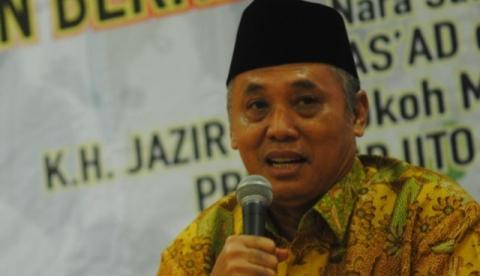Mustasyar NU explains more on the roots of radicalism
NU Online · Rabu, 18 Mei 2016 | 06:31 WIB
Bandung, NU Online
Radicalism has recently appeared in a number of Muslim countries including Indonesia and is primarily due to political factors both internally and externally. The difference lies in its scope in which since the end of the twentieth century it has become a scale global conflict that is coupled with violence and terrorism.
The member of the Advisory Board of Nahdlatul Ulama (NU) KH As'ad Said Ali made the remarks at a national seminar taking issues on Peace Education and Efforts of Preventing Religious Radicalism which was held Bandung, West Java, on Monday (16/5) ,
In the seminar held by the UPI Bandung in cooperation with the Nahdlatul Ulama Teachers Association (Pergunu), Asád who is also Chairman of Board of Trustees (BoT) of UPI Bandung, said that growing radicalism was caused by at least two factors. Firstly, there have been many many Muslim countries not succeeding in formulating the political system and governance in the modern era.
Furthermore, As'ad said that the Al-Quran and Hadith did not explicitly specify a particular model of state system. Therefore, some Muslim scholars have considered the organization of the Muslim community of Medina as an example that inspired the political system and governance.
The radicals, he added, required a theocratic state with the caliphate as the supreme leader. Instead, the moderates formulated a political system by considering contemporary realities that are tailored to Islamic law and the development of local cultures.
"The difference in the concept of state that is the source of the conflict leading to violence and terrorism," the former deputy head of the State Intelligence Agency (BIN) said.
Secondly, he added, after the Cold War there was a suspicion that the West is trying to systematically impose a liberal / secular system after being the 'champion' against communism. Liberal system or neo-liberalism was considered the only system being capable of creating prosperity and justice.
The neo-liberals, he added, had made the issues of globalization as a means of spreading certain lines of thought through any intervention, for example, in the preparation of legislation in Muslim countries and secularism through print, electronic and virtual media to change the culture of Muslims.
Of course, the moderate Muslims could not resist the inevitable process but must focus on dialogues on the basis of shared interests. On the contrary, the radicals have rejected it through global violence ie terrorism.
"Even the radicals have made the Muslims who disagree with them as the target of violence," As'ad said. (Masdar)
Terpopuler
1
Khutbah Jumat: Ramadhan, Melatih Sabar, Memperkuat Syukur
2
Khutbah Jumat: Tiga Kebahagiaan Orang Puasa
3
Gerhana Bulan Total Bakal Terlihat di Seluruh Indonesia pada Selasa 3 Maret 2026, Dianjurkan Shalat Khusuf
4
Gus Yahya Sebut Kepergian Ketum Fatayat Margaret adalah Kehilangan Besar bagi Keluarga NU
5
Ali Khamenei Wafat dalam Serangan Israel-Amerika
6
Khutbah Jumat: 4 Cara Menghidupkan Malam Ramadhan dengan Ibadah
Terkini
Lihat Semua
















